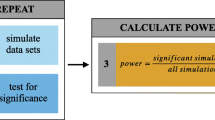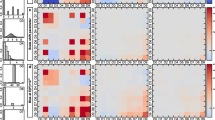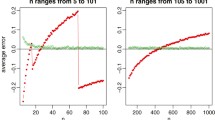Abstract
Maximum likelihood estimation (MLE) applied to ranked set sampling (RSS) designs is usually based on the assumption of perfect ranking. However, it may suffers of lack of efficiency when ranking errors are present. The main goal of this article is to investigate the performance of six alternative estimation methods to MLE for parameter estimation under RSS. We carry out an extensive simulation study and measure the performance of the maximum product of spacings, ordinary and weighted least-squares, Cramér-von-Mises, Anderson–Darling and right-tail Anderson–Darling estimators, along with the maximum likelihood estimators, through the Kullback–Leibler divergence from the true and estimated probability density functions. Our simulation study considered eight continuous probability distributions, six sample sizes and six levels of correlation between the interest and concomitant variables. In general, our results show that the Anderson–Darling method outperforms its competitors and that the maximum likelihood estimators strongly depends on perfect ranking for accurate estimation. Finally, we present an illustrative example using a data set concerning the percent of body fat. R code is available in the supplementary material.










Similar content being viewed by others
References
Akgül FG, Şenoğlu B (2017) Estimation of \(p(x< y)\) using ranked set sampling for the Weibull distribution. Qualit Technol Quantit Manag 14(3):296–309
Akgül FG, Acıtaş Ş, Şenoğlu B (2018) Inferences on stress–strength reliability based on ranked set sampling data in case of Lindley distribution. J Stat Comput Simul 88(15):3018–3032
Akram M, Hayat A (2014) Comparison of estimators of the Weibull distribution. J Stat Theory Pract 8(2):238–259
Al-Omari AI, Bouza CN (2014) Review of ranked set sampling: modifications and applications. Rev Investig Op 3:215–240
Al-Saleh MF, Al-Shrafat K, Muttlak H (2000) Bayesian estimation using ranked set sampling. Biom J J Math Methods Biosci 42(4):489–500
Amro L, Samuh MH (2017) More powerful permutation test based on multistage ranked set sampling. Commun StatSimul Comput 46(7):1–14
Binder DA, Patak Z (1994) Use of estimating functions for estimation from complex surveys. J Am Stat Ass 89(427):1035–1043
Bouza-Herrera CN, Al-Omari AIF (2018) Ranked set sampling: 65 years improving the accuracy in data gathering. Academic Press, Cambridge
Brožek J, Grande F, Anderson JT, Keys A (1963) Densitometric analysis of body composition: revision of some quantitative assumptions. Ann New York Acad Sci 110(1):113–140
Chen Z, Bai Z, Sinha B (2003) Ranked set sampling: theory and applications. Springer, Berlin
Cheng R, Amin N (1983) Estimating parameters in continuous univariate distributions with a shifted origin. J R Stat Soc Ser B (Methodol) 45(3):394–403
Cheng R, Amin N (1979) Maximum product-of-spacings estimation with applications to the lognormal distribution. Math Report 79
Dell T, Clutter J (1972) Ranked set sampling theory with order statistics background. Biometrics 28(2):545–555
do Espirito Santo A, Mazucheli J (2015) Comparison of estimation methods for the Marshall–Olkin extended Lindley distribution. J Stat Comput Simul 85(17):3437–3450
Esemen M, Gürler S (2018) Parameter estimation of generalized Rayleigh distribution based on ranked set sample. J Stat Comput Simul 88(4):615–628
Faraway J (2016) faraway: Functions and datasets for Books by Julian Faraway. https://CRAN.R-project.org/package=faraway, r package version 1.0.7
Frey JC (2007) New imperfect rankings models for ranked set sampling. J Stat Plan Inference 137(4):1433–1445
Godambe VP (1991) Estimating functions. Oxford University Press, Oxford
He X, Chen W, Qian W (2018) Maximum likelihood estimators of the parameters of the log-logistic distribution. Stat Papers. https://doi.org/10.1007/s00362-018-1011-3
Kullback S, Leibler RA (1951) On information and sufficiency. Ann Math Stat 22(1):79–86
Mazucheli J, Louzada F, Ghitany M (2013) Comparison of estimation methods for the parameters of the weighted Lindley distribution. Appl Math Comput 220:463–471
Mazucheli J, Ghitany M, Louzada F (2017) Comparisons of ten estimation methods for the parameters of Marshall–Olkin extended exponential distribution. Commun Stat Simul Comput 46(7):5627–5645
McIntyre G (1952) A method for unbiased selective sampling, using ranked sets. Aust J Agric Res 3(4):385–390
Modarres R, Hui TP, Zheng G (2006) Resampling methods for ranked set samples. Comput Stat Data Anal 51(2):1039–1050
R Core Team (2017) R: A language and environment for statistical computing. R Foundation for Statistical Computing, Vienna, Austria https://www.R-project.org/
Rodrigues GC, Louzada F, Ramos PL (2018) Poisson-exponential distribution: different methods of estimation. J Appl Stat 45(1):128–144
Sadek A, Sultan K, Balakrishnan N (2015) Bayesian estimation based on ranked set sampling using asymmetric loss function. Bull Malays Math Sci Soc 38(2):707–718
Takahasi K, Wakimoto K (1968) On unbiased estimates of the population mean based on the sample stratified by means of ordering. Ann Inst Stat Math 20(1):1–31
Vock M, Balakrishnan N (2011) A Jonckheere–Terpstra-type test for perfect ranking in balanced ranked set sampling. J Stat Plan Inference 141(2):624–630
Wolfe DA (2004) Ranked set sampling: an approach to more efficient data collection. Stat Sci 19(4):636–643
Acknowledgements
The authors thank the Editor and the Reviewers for their valuable comments on an earlier version of this manuscript.
Author information
Authors and Affiliations
Corresponding author
Additional information
Publisher's Note
Springer Nature remains neutral with regard to jurisdictional claims in published maps and institutional affiliations.
Rights and permissions
About this article
Cite this article
Taconeli, C.A., Bonat, W.H. On the performance of estimation methods under ranked set sampling. Comput Stat 35, 1805–1826 (2020). https://doi.org/10.1007/s00180-020-00953-9
Received:
Accepted:
Published:
Issue Date:
DOI: https://doi.org/10.1007/s00180-020-00953-9




